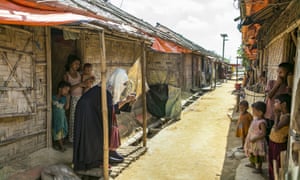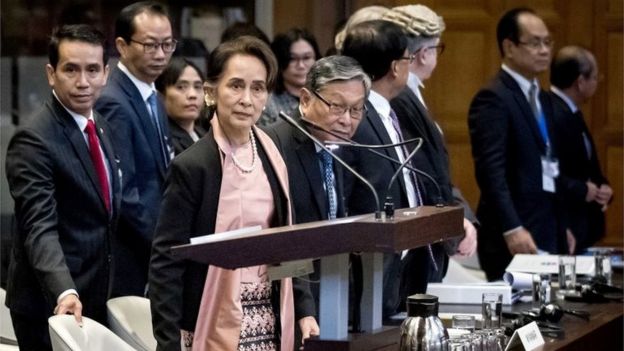The West African state of Gambia under its president Adama Barrow has initiated a move which will likely project the country on the international stage.
The Gambia has initiated proceedings against Myanmar at the International Court of Justice (the ICJ) submitting the Rohingya Muslim group are in “grave danger of further genocidal acts because of Myanmar’s deliberate and intentional efforts to destroy them as a group, (while) the remaining Rohingya communities and individuals in Myanmar continue to face daily threats of death, torture, rape, starvation and other deliberate actions aimed at their collective destruction, in whole or in part.”
The ICJ, the principal judicial organ of the United Nations aims to peacefully settle disputes between States and to issue advisory legal opinions in response to requests submitted by the U.N. General Assembly, the U.N. Security Council, other competent organs and specialised agencies. The ICJ hears legal disputes relating to international law and provides authoritative judgments.

Gambia’s Attorney General and Justice Minister, Abubacarr M. Tambadou says the international community cannot watch on while another Rwanda happens referring to the 1994 genocide.
The November 11, 2019, application filed by The Gambia alleges that the Government of Myanmar has been involved in atrocities against the Rohingya Muslims, including “killing, causing serious bodily and mental harm, inflicting conditions that are calculated to bring about physical destruction, imposing measures to prevent births, and forcible transfers, are genocidal in character because they are intended to destroy the Rohingya group in whole or in part” in violation of the Genocide Convention.
The application further alleges that: “From around October 2016 the Myanmar military (the “Tatmadaw”) and other Myanmar security forces began widespread and systematic “clearance operations” – the term that Myanmar itself uses – against the Rohingya group. The genocidal acts committed during these operations were intended to destroy the Rohingya as a group, in whole or in part, by the use of mass murder, rape and other forms of sexual violence, as well as the systematic destruction by fire of their villages, often with inhabitants locked inside burning houses. From August 2017 onwards, such genocidal acts continued with Myanmar’s resumption of “clearance operations” on a more massive and wider geographical scale.”
The document discusses various evidential sources, said to show the atrocities perpetrated against the Rohingya Muslims, including evidence obtained by several U.N. mechanisms while also requesting the implementation of several provisional measures to take effect as a matter of urgency.

Myanmar’s leader Aung San Suu Kyi in response is appearing at the UN International Court of Justice (ICJ) to defend her country against accusations of genocide. The Nobel Peace Prize laureate has heard allegations Myanmar committed atrocities against Muslim Rohingya.
Suu Kyi was married to Michael Vaillancourt Aris, an English historian who wrote and lectured on Bhutanese, Tibetan and Himalayan culture and history.
Suu Kyi made a return to Myanmar after spending years abroad. Her activism against the brutal rule of dictator U Ne Win landed her under house arrest in 1989 spending 15 of the next 21 years in custody, and winning the 1991 Nobel Prize for Peace.
It was in November 2010 that Suu Kyi was finally released from house arrest where she subsequently held a seat in parliament for the National League for Democracy (NLD) party. Following the NLD’s victory in 2016 parliamentary elections, Suu Kyi became the de facto head of the country in the new role of state counselor but the military still wield considerable power and some observers reckon hold sway over the noble laureate hence her inability to halt the attacks on the Rohingya, despite global condemnation.
Thousands of Rohingya were killed and more than 700,000 fled to neighbouring Bangladesh during an army crackdown in the Buddhist-majority country in 2017. The country insists it was tackling an extremist threat.

Ms Suu Kyi, used to be seen as an icon for global human rights but now defends the actions of the same army that kept her under house arrest for years.
The Gambia at the initial three-day hearing, it is asking the ICJ in The Hague to approve temporary measures to protect the Rohingya. But a final ruling on genocide may be years away.
At the start of 2017, there were one million Rohingya in Myanmar (formerly Burma), most living in Rakhine state but Myanmar, a mainly Buddhist country, considers them illegal immigrants and denies them citizenship.
The conundrum of Ms Suu Kyi who has been de facto leader of Myanmar since April 2016 is that she does not have control over the army yet stands accused by the UN investigator of “complicity” in the military clearances.
The Gambia meanwhile enjoys the support of the 57-member Organisation of Islamic Co-operation (OIC) and a team of international lawyers to push the case although the ICJ itself has no way of enforcing the outcome – and neither Aung San Suu Kyi nor the generals would automatically be arrested and put on trial.
However, a guilty ruling could lead to sanctions, and would cause significant reputational and economic damage to Myanmar.










